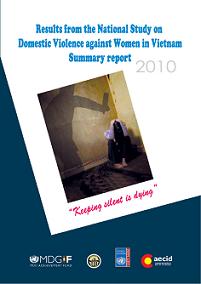

Nuevo estudio demuestra la alta incidencia de violencia domestica en Viet Nam

Ha Noi, 25 November 2010 – One in three, or 34 percent, of ever-married women report that they have suffered physical or sexual violence from their husbands at some time in their lives, according to the National Study on Domestic Violence Against Women in Viet Nam, launched today by the Government of Viet Nam and the United Nations. Ever-married women who are currently experiencing either of these two types of violence amount to 9 percent.
When all three main types of partner violence – physical, sexual and emotional – are considered, more than half (58 percent) of Vietnamese women report experiencing at least one type of domestic violence in their lifetime. The study findings also show that women are three times more likely to be abused by a husband than by any other person.
“For the first time, a study seeks to obtain detailed information nationwide about the prevalence, frequencies and types of violence against women, looking at the health outcomes of domestic violence, the factors that may protect or put women at risk of domestic violence and showing coping strategies and services that women use to deal with domestic violence,” explained Tran Thi Hang, Deputy General Director of GSO.
New data from the study highlight the fact that most women in Viet Nam are potentially at risk of domestic violence at some point in their lives. In some regions of the country, the home is not a safe place for four out of ten women. In the South East region, for example, 42 percent of women report having experienced physical or sexual violence by their husbands at some time. However, while there are regional variations, greater differences are evident between different ethnic groups, with reported lifetime prevalence rates of domestic violence ranging from 8 percent (H’Mong) to 36 percent (Kinh).
“Although domestic violence is widespread, the problem is very much hidden,” said Ms. Henrica A.F.M. Jansen, the lead researcher of the study. “Besides the stigma and shame causing women to remain silent, many women think that violence in relationships is ‘normal’ and that women should tolerate and endure what is happening to them for the sake of family harmony.” In fact, one in two women said that before the survey interviews, they had never told anyone about instances of violence by their husbands.
“This report highlights the urgency of breaking the silence,” stressed Jean Marc Olive, WHO Representative in Viet Nam. “All of us owe it to the women who suffer from domestic violence, and the women who took part in this survey, to step up, speak out, and end domestic violence.”
It is clear that domestic violence has serious consequences on both the physical and mental health of women. In Viet Nam, one in four women who were physically or sexually abused by their husbands reported suffering physical injuries, and more than half of them reported being injured multiple times. Compared to women who have never been abused, those who have experienced partner violence are almost two times more likely to report poor health and physical problems, and three times more likely to have ever thought of suicide.
Pregnant women are also at risk. According to the report, about 5 percent of women who had been pregnant reported being beaten during pregnancy. In almost all of these cases, the women had been abused by the father of the unborn child.
Although domestic violence takes a heavy toll on women, children are also victims. Almost one in four women with children under 15 years of age reported that their children have been abused physically by their husbands. The study indicates that domestic violence poses serious risks for the well-being of the children. For example, the report shows that children living in a household where their mother was abused by her husband were more likely to have behavioral problems compared to other children.
“Women who have been abused have more chances to have a husband whose mother was beaten or who was himself beaten when he was a child. The childhood experience of the husband is an important risk factor with respect to him being a perpetrator later in life,” said Jansen. This reinforces the idea that violence is a learned behavior.
Full Report National Study on Domestic Violence Against Women in Viet Nam- Part 1
Full Report National Study on Domestic Violence Against Women in Viet Nam- Part 2